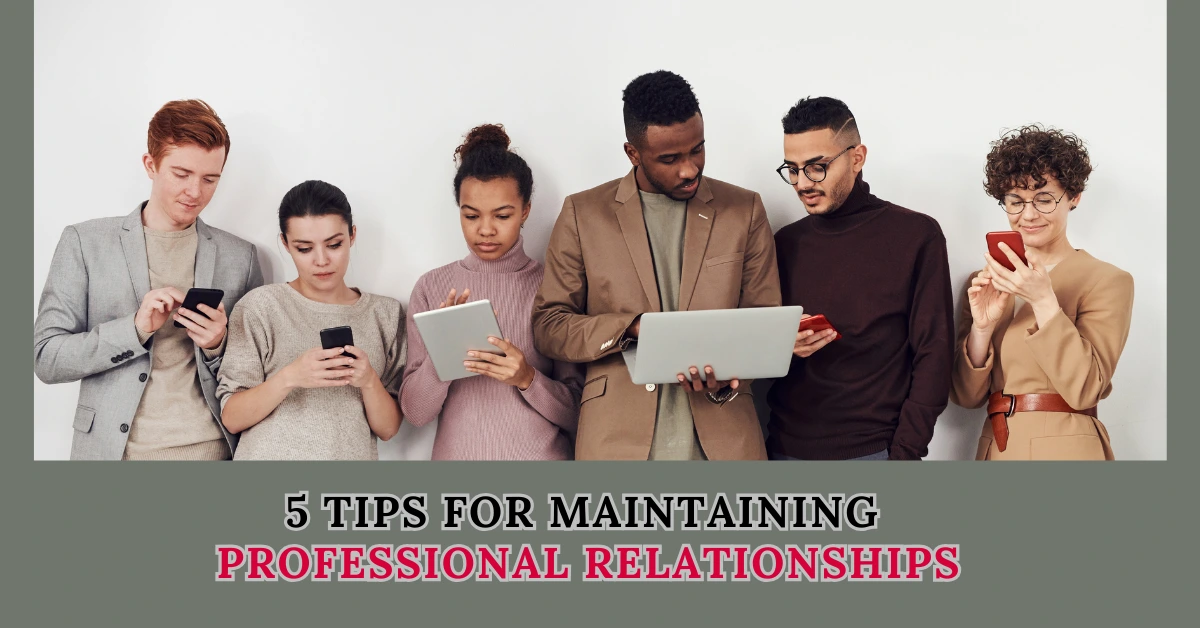
5 Tips for Maintaining Professional Relationships
- 110
- 0
- 0
Maintaining professional relationships is essential for several reasons. Strong connections with colleagues and clients lead to better communication, teamwork, and collaboration. These relationships can create a positive work environment, making it easier to share ideas and solve problems together. Networking with professionals in your field can open doors to new opportunities and career growth. Additionally, good relationships can provide support during challenging times, boosting morale and motivation. Overall, investing time in nurturing professional relationships enhances your career success and contributes to a more enjoyable work experience.
5 Tips for Maintaining Professional Relationships
In today’s work world, knowing how to build and keep good professional relationships is important. These connections can help you do better at your job, find new chances to grow, and make your work life more enjoyable. But sometimes, it can be tricky to know how to handle these relationships the right way. Don’t worry – we’ve got you covered! In this blog post, we’ll share five helpful tips for maintaining professional relationships.
Be Reliable and Keep Your Promises

One of the most important things in any relationship, including professional ones, is trust. When people know they can count on you, they’re more likely to want to work with you and help you out when you need it. Here are some ways to show you’re reliable:
- Do what you say you’ll do: If you tell someone you’ll finish a task by Friday, make sure you do it. If you promise to send an email or make a phone call, follow through.
- Be on time: Whether it’s for meetings, deadlines, or just regular work hours, try to always be punctual. Being late can make others feel like you don’t value their time.
- Speak up if you’re having trouble: Sometimes, things don’t go as planned. If you realize you can’t keep a promise or meet a deadline, let the other person know as soon as possible. Explain the situation and suggest a new plan.
- Be consistent: Try to maintain a steady level of work quality and behavior. When people know what to expect from you, it helps build trust.
Remember, being reliable doesn’t mean you have to be perfect. Everyone makes mistakes sometimes. The key is, to be honest about it and do your best to fix any problems that come up.
Communicate Clearly and Often

Good communication is the foundation of any strong relationship, and professional relationships are no different. Clear and regular communication can help prevent misunderstandings, keep projects on track, and make sure everyone is on the same page. Here’s how you can enhance your communication:
- Listen actively: When someone is speaking to you, give them your full concentration. Try to understand not just what they’re saying, but also why they’re saying it. Ask questions if you’re not sure about something.
- Be clear and direct: When you’re sharing information or giving instructions, try to be as clear as possible. Use simple language and give specific details when needed.
- Use the right communication method: Sometimes an email is best, other times a quick chat in person or a phone call might work better. Think about what information you need to share and choose the best way to do it.
- Keep people updated: If you’re working on a project with others, let them know how things are going. Share both good news and any problems that come up.
- Be open to feedback: Ask for input from others and be willing to listen to their ideas and suggestions. This shows that you value their opinions and helps build stronger working relationships.
- Watch your tone: In written communication like emails or messages, it can be hard to tell someone’s tone. Be careful with your words and try to sound friendly and professional.
Good communication takes practice, but it’s worth the effort. When you communicate well, you’ll find that your work relationships become smoother and more productive.
Show Respect and Appreciation

Treating others with respect and showing that you appreciate their work can go a long way in building strong professional relationships. When people feel valued and respected, they’re more likely to enjoy working with you and to put in extra effort when needed. Here are some ways to show admiration and gratitude:
- Be polite: Use good manners in all your interactions. Say “please” and “thank you,” and bypass interrupting others when they’re talking.
- Respect differences: People have different backgrounds, opinions, and ways of working. Try to understand and accept these differences instead of judging them.
- Give credit where it’s due: When someone does good work or helps you out, make sure to acknowledge it. You could mention their contribution in a meeting, send them a thank-you note, or let their boss know about their good work.
- Offer help: If you see a coworker struggling with something and you have the time and knowledge to help, offer your assistance. This shows that you care about the team’s success, not just your own.
- Be mindful of others’ time: Don’t schedule unnecessary meetings or send emails that could have been a quick conversation. Respect that others have their work to do.
- Celebrate successes: When your team or a coworker achieves something, take a moment to celebrate. This could be as easy as saying “Excellent job!” or managing a small celebration for bigger accomplishments.
- Avoid gossip: Speaking negatively about others behind their backs can damage relationships and create a toxic work environment. If you have a problem with someone, try to address it directly with them in a respectful way.
Remember, showing respect and appreciation isn’t about big gestures. Often, it’s the small, everyday actions that make the biggest difference in how people feel about working with you.
Be Professional and Maintain Boundaries

While it’s great to have friendly relationships with your coworkers, it’s also important to keep things professional. Finding the right balance can help you maintain positive relationships without crossing any lines. Here are some suggestions for staying skilled:
- Keep personal and work life separate: It’s okay to chat about personal things sometimes, but try not to let personal issues affect your work or take up too much time during the workday.
- Be careful with social media: If you’re connected with coworkers on social media, think carefully about what you post. Avoid sharing things that might be inappropriate or cause problems at work.
- Dress appropriately: Follow your workplace’s dress code. Even if your office is casual, make sure your clothes are clean and neat.
- Watch your language: Avoid using swear words or telling inappropriate jokes at work. What’s funny among friends might not be okay in a professional setting.
- Handle conflicts calmly: If you disagree with a coworker, try to resolve them professionally. Avoid yelling, name-calling, or getting too emotional. If you require help, talk to your supervisor or HR.
- Keep confidential information private: If someone shares something with you in confidence, or if you have access to private company information, make sure to keep it to yourself.
- Be aware of workplace relationships: If you become close friends with a coworker or start dating someone from work, be extra careful to keep things professional in the office. Make sure your relationship doesn’t affect your work or make others uncomfortable.
- Know when to say no: It’s good to be helpful, but sometimes you need to set boundaries. If a coworker often asks for favors that interfere with your work, it’s okay to politely decline.
By maintaining professional boundaries, you create a respectful and comfortable work environment for everyone. This doesn’t mean you can’t be friendly or have fun at work – it just means being mindful of what’s appropriate in a professional setting.
Grow and Maintain Your Network

Building a strong professional network can help you in many ways throughout your career. It can lead to new job opportunities, help you learn new skills, and provide support when you need it. Here are some tips for growing and maintaining your professional network:
- Attend work events: Go to company parties, team-building activities, or industry conferences when you can. These are great chances to meet new people and strengthen existing relationships.
- Join professional groups: Look for organizations related to your field of work. These groups often have meetings, online forums, or events where you can connect with others in your industry.
- Use professional social media: Sites like LinkedIn are great for staying in touch with colleagues and making new connections. Keep your profile up to date and engage with others’ posts.
- Offer to help others: If you hear about a job opening that might be good for someone you know, let them know. Or if you have a skill that could help a coworker, offer to teach them. People recognize when you’ve enabled them out.
- Stay in touch: Don’t only reach out to people when you need something. Send occasional notes to review in, share interesting articles, or compliment them on their accomplishments.
- Be a good listener: When you’re talking to people, show genuine interest in what they’re saying. Ask questions about their work and their goals. People appreciate feeling heard.
- Follow-up after meetings: If you meet someone new at an event or have a good conversation with a coworker, send them a quick message afterward. Thank them for their time or mention something specific you talked about.
- Look for mentorship opportunities: Whether you’re looking for a mentor or you could be one to someone else, these relationships can be very valuable for professional growth.
- Be open to new connections: You never know where a new professional relationship might lead. Be open to meeting new people and learning about different areas of work.
Recognize, networking isn’t just about what others can accomplish for you. It’s about building genuine relationships and being willing to help others too. The most powerful networks are made on reciprocal support and respect.
Conclusion
In conclusion, maintaining professional relationships takes effort, but it’s well worth it. By being reliable, communicating well, showing respect and appreciation, staying professional, and nurturing your network, you can build strong, lasting connections in your work life. These relationships can make your job more enjoyable, help you grow in your career, and open up new opportunities. Remember, every interaction is a chance to strengthen a professional relationship. With practice and patience, you’ll find that maintaining these relationships becomes a natural part of your work life.
FAQs
Q: Why are professional relationships important?
A: Professional relationships are crucial because they enhance communication and teamwork. Good connections with colleagues and clients lead to collaboration, helping everyone achieve their goals and creating a positive work environment.
Q: How can I build professional relationships?
A: You can build professional relationships by networking, attending events, and engaging in conversations with colleagues. Being friendly, approachable, and showing genuine interest in others helps create strong connections that benefit everyone involved.
Q: What are the benefits of strong professional relationships?
A: Strong professional relationships lead to improved teamwork, better communication, and increased opportunities for career growth. They also provide support during tough times, helping to boost morale and motivation in the workplace.
Q: How can I maintain professional relationships?
A: To maintain professional relationships, stay in touch regularly, offer help when needed, and show appreciation. Being respectful and open to feedback also strengthens connections and encourages a positive work atmosphere.
Q: What happens if I neglect professional relationships?
A: Neglecting professional relationships can lead to poor communication and teamwork. It may result in missed opportunities for collaboration and growth, and create a negative work environment, which can affect overall job satisfaction and productivity.
Also Read:
How to Build Strong Relationships: 7 Tips for Lasting Connections
References:
https://hbr.org/2022/06/the-power-of-healthy-relationships-at-work
https://pmc.ncbi.nlm.nih.gov/articles/PMC6316783/
https://en.wikipedia.org/wiki/Workplace_relationship
Disclaimer:
This blog provides general tips for maintaining professional relationships. The content is for informational purposes only and not a substitute for personalized advice. Readers should consider their unique circumstances and seek professional guidance if necessary.
Related post

7 Health Benefits of Assam Tea


